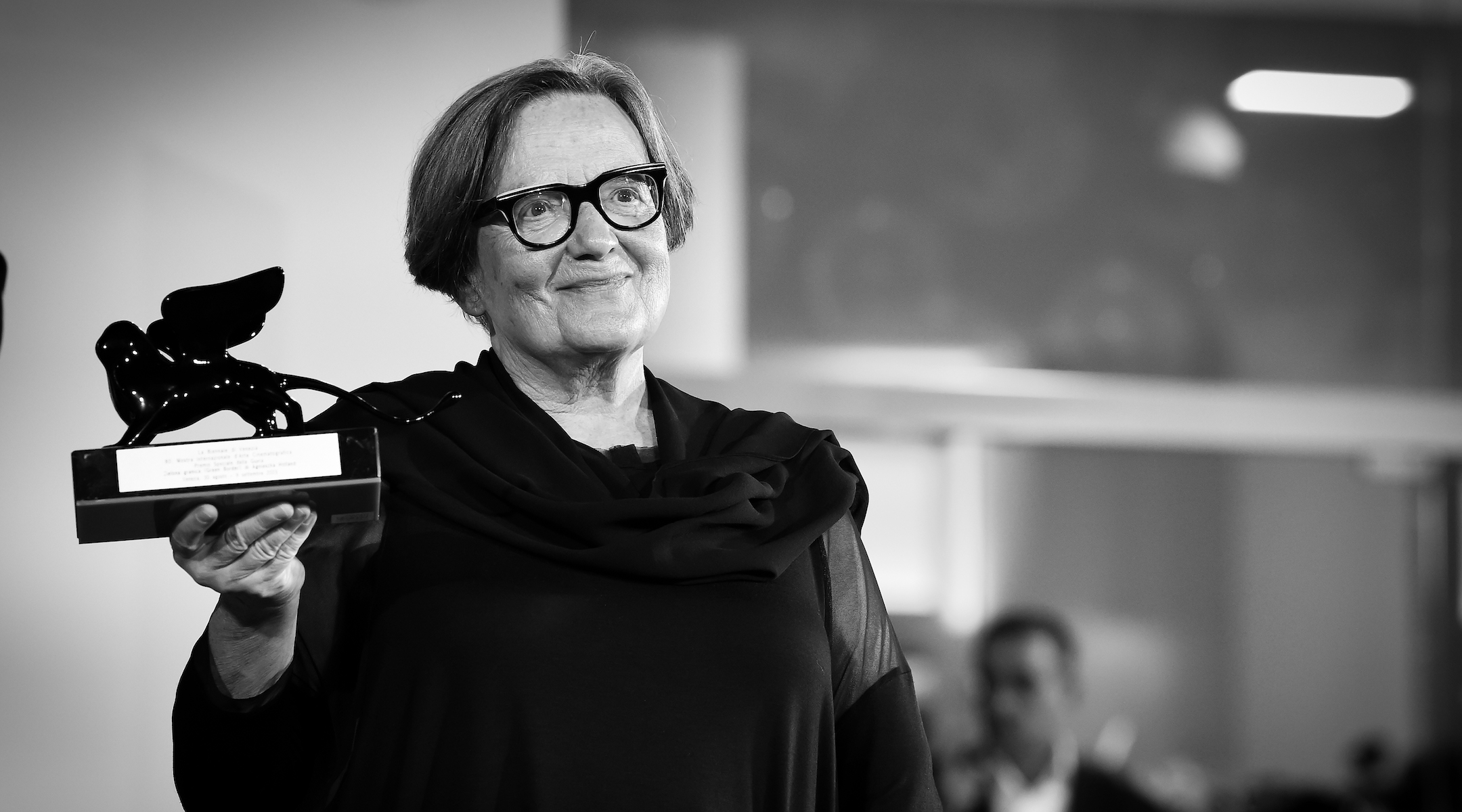A Polish director with Jewish heritage made a movie about the migrant crisis. The government compared it to Nazi propaganda.
An association of European filmmakers came to Holland’s defense, noting that her parents took part in the Warsaw Ghetto Uprising

Polish director and screenwriter Agnieszka Holland walks the red carpet at the 80th Venice International Film Festival in Italy, where her film “The Green Border” won the special jury award, Sept. 9, 2023. (Marilla Sicilia/Archivio Marilla Sicilia/Mondadori Portfolio via Getty Images)
(JTA) — Poland’s justice minister is embroiled in a feud with one of the country’s best-known filmmakers after comparing her award-winning new movie about Europe’s migrant crisis to Nazi propaganda.
The director, Agnieszka Holland, is the daughter of a Catholic mother and Jewish father, both of whom were part of the Warsaw Ghetto uprising. Her paternal grandparents died in the ghetto.
Holland’s latest film, “The Green Border,” tells the story of Syrian and Afghan refugees whose fates collide with a guard at the Poland-Belarus border. It premiered at the Venice Film Festival earlier this month, where it garnered rave reviews and won the special jury prize.
But reception has been much more hostile in Poland. Last week, several of the country’s right-wing ministers, including justice minister Zbigniew Ziobro, attacked the film by saying its depiction of border agents insulted the country. Ziobro’s attacks, in particular, stoked Holland’s ire when he likened it to Nazi propaganda on X, the social media platform formerly known as Twitter.
“In the Third Reich, the Germans produced propaganda films showing Poles as bandits and murderers,” Ziobro wrote. “Today they have Agnieszka Holland for that.” He later compared Holland to a communist.
A broadbased attack
The film’s social media pages have since been swarmed with antisemitic trolls, according to its sales agent. An irate Holland has threatened legal action against Ziobro, who is mentioned by name in the film. She has demanded that he apologize and make a donation to a Polish organization supporting Holocaust survivors.
An association for European filmmakers has come to Holland’s defense. “Agnieszka Holland was compared to the propagandists of the Third Reich by the Minister, even though the filmmaker is the daughter of a liaison officer of the Warsaw Uprising and the granddaughter of victims of the Holocaust,” the European Film Academy said in a statement, adding that Ziobro’s comments represented “personal hostility and threats.”
The episode demonstrates how intensely the current migration crisis has divided Poland, which has become the European frontline for the wave of refugees since Belarusian dictator Alexander Lukashenko started encouraging mass migration across his country’s border in 2021. Lukashenko, a key ally of Russian President Vladimir Putin, is thought to be pursuing a strategy to flood Poland with migrants as a means of destabilizing the West.
A provocative filmmaker
As Poland’s government has shifted far to the right in recent years, Polish leaders have attacked local historians who suggest the country was complicit during the Holocaust, drawing condemnation from international bodies. The government has also become increasingly anti-migrant, although it has opened its borders to Ukrainian refugees fleeing the war with Russia. Just this week, it became engulfed in a scandal regarding work visas that officials were allegedly being sold to migrants in exchange for bribes.
Holland has a history of making provocative films about the Holocaust, even drawing the ire of leading European Jews. “Shoah” director Claude Lanzmann accused her of antisemitism for her Oscar-nominated 1990 film “Europa, Europa,” which tells the true story of a Jewish child who disguised himself as a Nazi in order to survive during the war. Some Jews were also angered by another film Holland wrote about the Jewish doctor Janusz Korczak, who tried and failed to save hundreds of Jewish children in the Warsaw Ghetto. Holland’s 2011 film “In Darkness,” also Oscar-nominated, is about Jews in hiding in Nazi-occupied Poland.
“The Green Border” is scheduled for release later this month in Poland.
This article originally appeared on JTA.org.














